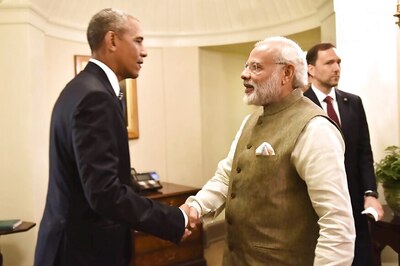
views
Dozens of Black former University of Michigan student-athletes who claim they were abused by a sports doctor who worked there for decades on Wednesday asked the university to treat them fairly as it settles hundreds of lawsuits expected to cost the school millions of dollars.
They’re demanding that victims of Dr. Robert Anderson receive fair compensation based on their trauma rather than based on their color.
Most personal injury cases are settled out of court with the amounts often based on data that projects lower lifetime earnings for Blacks, Latinos and women than white men, said Parker Stinar, an attorney with Denver-based Wahlberg, Woodruff, Nimmo & Sloane law firm.
Some victims of Anderson were expected to discuss their experiences during a Wednesday morning news conference in the Detroit suburb of Novi. They included Dwight Hicks, who captained the school’s football team in 1977 and later won two Super Bowls as a member of the San Francisco 49ers.
Stinar said nearly half of the 750 men claiming to have been sexually abused by Anderson are Black.
As plaintiff trial lawyers, we are familiar with the prejudices that jurors have against plaintiffs, especially plaintiffs that are minority men, Stinar said. Historically, Black men receive the lowest verdict or settlement awards, especially compared to white men and women.
Anderson worked at the university from the mid-1960s through 2003. He died in 2008.
Campus police began investigating him in 2018 after a former student-athlete wrote to athletic director Warde Manuel about being sexually abused during medical exams in the early 1970s.
The university has acknowledged some campus employees were aware of accusations against Anderson before the 2018 complaint. The school started an independent investigation into the claims, which date back as far as the 1960s.
In February, it established a hotline for complaints about Anderson.
The university has not yet shared details of any settlement process, a school spokesman said Tuesday in an email.
Insurance companies and courts rely on testimony of economic experts who use wage tables to calculate damages based on lost earnings and wages, according to a 2018 report by the Lawyers Committee for Civil Rights Under Law.
How Race, Ethnicity, and Gender Impact Your Lifes Worth: Discrimination in Civil Damage Awards says the data typically comes from the quarterly population survey by the U.S. Bureau of Labor.
That data often is based on the race, ethnicity and gender of the person filing the lawsuit, and since Blacks, Latinos and Hispanics and women of all races typically earn less than white men, the damages offered and awarded often are less than what white men would receive, the report said.
The practice of forensic economists using race, gender or ethnicity to calculate civil damages really hurts communities of color and women because historically they have been paid less because of structural and systemic discrimination in the workplace, said Dariely Rodriguez, director of the Economic Justice Project of the Lawyers’ Committee and co-author of the report.
Ultimately, those damages are going to be lower than the damages that you see for white men, she added.
Dollar amounts of many settlements never are publicized because 90% of personal injury and wrongful death cases are settled out of court, Rodriguez said.
Many of these cases never even make it to the courthouse, she said. A lot of the discrimination that we discussed in our report happens behind closed doors.
The Associated Press left messages Tuesday seeking comment from the National Association of Forensic Economics.
Airron Richardson, an emergency physician and former wrestler at the University of Michigan, hopes that the school properly compensates Andersons victims while developing programs to educate student-athletes on what to do if they believe theyre victims of abuse.
I am optimistic that U-M will do the right thing and right some of the wrongs that have persisted for so long on the campus, and I really hope that they are really not entertaining thoughts of trying to discount us in any way, Richardson, 44, told The Associated Press last week.
Richardson also was expected to speak at Wednesday’s news conference and is not yet part of the lawsuits against the school. He arrived as a sophomore in 1994 on the Ann Arbor campus and was seen by Anderson for his annual physicals and occasionally for strep throat.
I vividly remember being in the exam room, him looking in my throat, him giving me antibiotics, Richardson said. But he also did a genital exam and I remember seeing posters on the exam room talking about how to properly perform a testicular exam.
Anderson performed the exam under the guise of checking for testicular cancer, said Richardson, who is Black and now lives in Chicago.
At the time, I thought it seemed a little odd, but his explanation made me think OK, it seems normal, he said. If he can help me prevent it or catch it early, hes doing me a favor.
Richardson said he knew athletes who were given prostate exams by Anderson.
I feel like I was too nave, he said. I believed he was helping us. It wasnt until later when Im in medical school understanding thats not part of a normal exam.
Disclaimer: This post has been auto-published from an agency feed without any modifications to the text and has not been reviewed by an editor



















Comments
0 comment